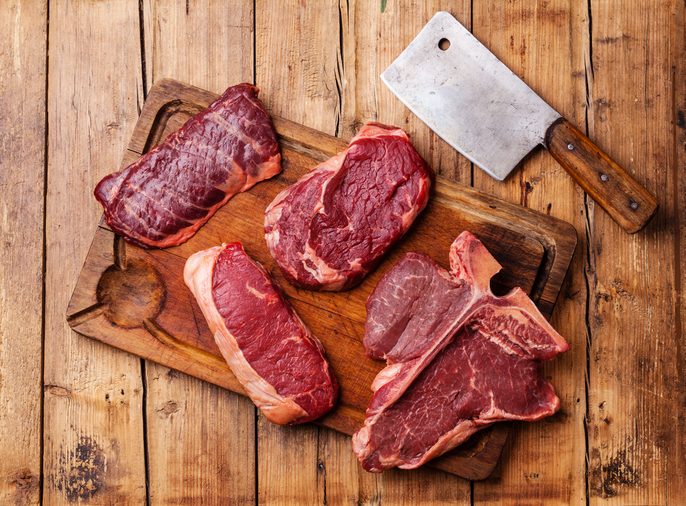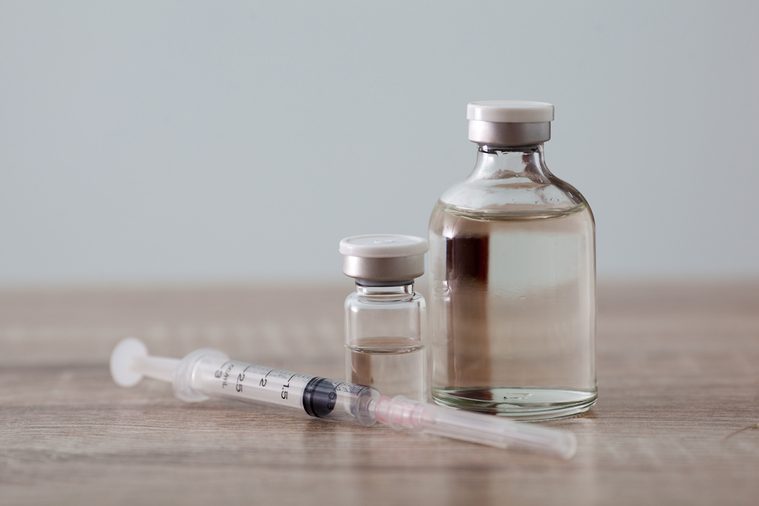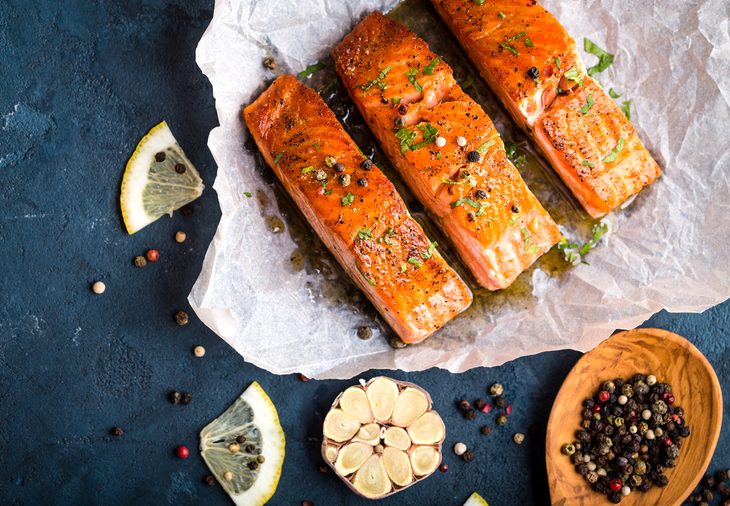
Fat
Many people believe that all fat is bad and will cause a heart attack, but that’s just not true, says Deepak L. Bhatt, MD, MPH, executive director of Interventional Cardiovascular Programs at Brigham and Women’s Hospital in Boston. There are good fats, bad fats, and really bad—trans—fats, he says. “Good fats [in] olive oil, nuts, and avocado are actually cardioprotective when consumed in moderation.” Saturated fats found in meat and full-fat dairy are less good for you, and the worst offenders of all are trans fats which are formed through a manufacturing process that adds hydrogen vegetable oil at high heat to convert a liquid into a solid fat when it comes to room temperature. It can be shocking to learn about the foods that sneak in trans fats. The good news is, trans fats are going to be far less common when the U.S. Food and Drug Administration ban goes into effect (June 18, 2018).

Eggs
Egg white omelets are a common restaurant order for cholesterol-conscious individuals looking to avoid cholesterol in egg yolks, but new research shows a whole egg a day may keep heart disease away, including the yolk. Chinese researchers found that subjects who ate an egg a day had lowered risks for heart disease and stroke compared to those who never or rarely ate eggs. While it’s true that the Chinese consume less cholesterol than Americans overall, “it’s a bit of a myth that cholesterol in the diet is what causes a heart attack,” Dr. Bhatt says. “For most people it has a small effect on risk. If you have high cholesterol, eating a low cholesterol diet is still good advice, as [it] has other heart-healthy aspects to it, such as high fiber and healthy fats.” Check out these healthy egg recipes.

Red meat
It’s not that burgers and T-bone steaks are heart-healthy all of a sudden, but according to new research, lean and unprocessed red meat, when eaten as part of a Mediterranean-style diet, may improve heart health. “This study is important because it shows that red meat can be part of a heart-healthy eating pattern, like a Mediterranean-style eating pattern,” says Wayne W. Campbell, professor of nutrition science at Purdue University in West Lafayette, IN, in a news release. “This study was not designed to promote red meat intake, and we are not encouraging people who otherwise consume a vegetarian-style eating pattern to begin consuming red meat,” he adds. What the study shows is that adults who are overweight or moderately obese can benefit from a Mediterranean-style diet with or without red meat when the red meats are lean and unprocessed.

Your weight
Obesity is a major risk factor for heart disease, but there’s more than one way to be overweight. The number on the scale may not tell the full story. “There is something we call the obesity paradox,” explains Nehal Mehta, MD, chief of Inflammation and Cardiometabolic Diseases at the National Heart, Lung, and Blood Institute in Bethesda, MD.”People who are super lean have more heart disease and people who are obese have less.” Researchers are still figuring this all out but the theory is that fat around the organs (visceral fat) is more dangerous than fat on the hips and limbs of the body (subcutaneous fat). “You could be a lean person and still have fat around your organs that increase your risk for heart disease,” he says. “Your risk is driven by what is around the organs, not the fat that we see.” This is just one of the myths about fat we need to stop believing right now.

Marriage
While many a married person has like thought at one time or another that the demands of their spouse is going to give them a heart attack, the opposite is true. Many studies have associated marriage with improved risk of heart health disease (and overall health in general). But the quality of the marriage matters. A recent study of married men in the U.K. found that marriages that improve over time confer the greatest protection against heart disease and stroke in men. Exactly how marriage protects the heart is not fully understood. It could be that spouses take care of their partners and ensure they stay healthy. But it could also be that men who remain in a marriage and are committed to working on it long-term simply have other qualities associated with positive health. Here are other ways marriage protects your health.

The salt shaker
The salt shaker has been pretty much demonized, due to concerns that sodium increases risk of heart disease, but it’s not the salt in the shaker that matters. More than 75 percent of the sodium in our diet comes from processed, prepackaged, and restaurant foods—not from table salt, according to the American Heart Association AHA. Some salts may even confer health benefits. For example, here’s what you need to know about Himalayan pink salt.
The AHA recommends no more than 2,300 mg a day and an ideal limit of no more than 1,500 mg per day for most adults.

Testosterone replacement therapy
Men’s levels of the sex hormone testosterone tend to decline as they age; some experts believed that replacing the dwindling supply would be a panacea. But in 2015 the FDA issued a warning that testosterone supplements may increase heart risks and stated that testosterone replacement should be reserved for younger men with documented testosterone deficiency disorders.
Despite the back and forth, the latest research shows that testosterone may actually improve heart health among older men. “It tends to get a bad rap because some studies suggest it can increase heart disease risks, but when prescribed to the right person in the right doses, it doesn’t hurt the heart and may even help it,” says Evan Appelbaum, MD, a cardiologist at Men’s Health Boston, a Harvard-affiliated multi-specialty practice. If you’re considering testosterone replacement therapy, here are 10 questions you should ask your doctor about testosterone.)

Lifestyle habits
We’ve all been pre-programmed to think that all heart attacks are a result of risk factors like high cholesterol, high blood pressure, diabetes, obesity, and smoking. Yet only about half of heart attacks can be attributed to these risk factors, Dr. Mehta says. Inflammation may be the real “smoking gun” in other cases, he says. Here are some expert-approved ways to fight inflammation.

Being a guy
Heart disease does not discriminate. It is the leading cause of death in men and women over age 65, according to the Centers for Disease Control and Prevention. Here are some of the ways that heart disease is different for women.

Older age
You don’t have to be “old” to have a heart attack. Due to skyrocketing rates of childhood obesity, many risks previously only seen in adults, such as high blood pressure and type 2 diabetes, are now being diagnosed in young kids. Here are 13 smart and sensitive ways to talk to your kids about their weight.

Seafood phobia
The AHA recommends eating fatty fish such as mackerel or salmon at least twice a week for optimal heart health, but don’t panic if you hate fish. You can get your omega-3’s without fish in these 7 easy ways—and not miss out on the heart-healthy benefits.

Exercise
Many people with a history of heart disease are fearful of exercise—but that is definitely not heart smart. Physical activity, as long as your doctor has given you the green light, will strengthen your heart muscle and improve your overall health. The AHA recommends at least two and a half hours of moderate-intensity physical activity each week. Exercise is just one of 30 ways to lower your heart disease risk.

Sex
Despite what you may have seen depicted in movies, heart attacks or chest pain caused by heart disease—what’s known as cardiovascular events—rarely occur during sexual activity, say experts. Why? Because sexual activity rarely lasts long enough to exacerbate heart troubles. (No comment.) If you have a heart condition make sure to clear sexual activity with your doctor. On the other hand, erectile dysfunction (ED) can be a red flag for heart disease.”ED may mean there’s a lack of blood flow, and that can signal trouble in other parts of the body, such as the heart and brain,” notes the AHA.

Alcohol
Alcohol is a double-edged sword when it comes to heart health. Excessive drinking can raise blood pressure as well as levels of dangerous blood fats called triglycerides, but there’s also a body of research suggesting that moderate alcohol intake (red wine, in particular) can improve heart health. Right now, the AHA is funding research to figure out whether the benefits that seem to come from drinking wine is due to flavonoids and other antioxidants, an increase in high-density lipoprotein or “good” cholesterol, or if booze in general delivers anti-blood clotting benefits. Nonetheless: “Right now the AHA does not recommend drinking wine or any other form of alcohol to gain these potential benefits.” Here’s what the science says about how alcohol and heart disease are linked.
